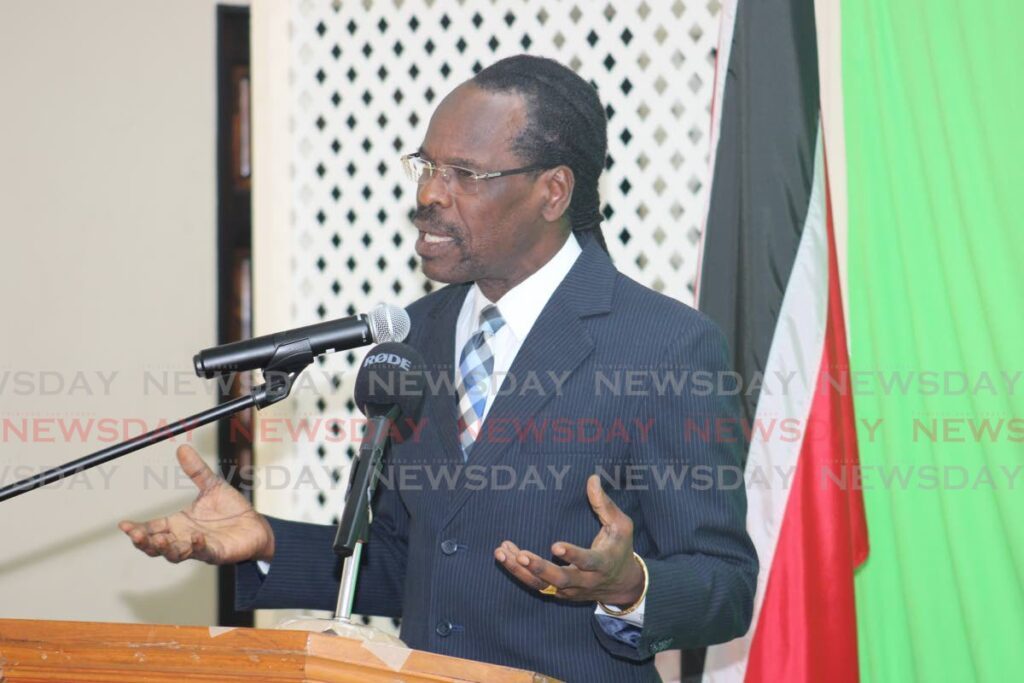Hinds excited about police Counter Trafficking Unit

NATIONAL Security Minister Fitzgerald Hinds is excited about the future of the police Counter Trafficking Unit (CTU) under its new leadership.
Director Allan Meiguel and deputy director W/Cpl Dane-Marie Marshall were both appointed on January 3, 2024, but their appointments were not formally announced.
Hinds was speaking on Tuesday at the launch of a four-day training programme by the Heal, Empower, Rise, Counter Trafficking in Persons (HER CTIP) Project.
This training programme provides shelter management training to the management and staff of facilities built to house victims of human trafficking.
Marshall gained national recognition in November 2023 when it was revealed she was the police officer responsible for Trinidad and Tobago’s first and only human-trafficking conviction to date.
Marshall arrested Anthony Michael Smith, 38, who was convicted of five charges under the Human Trafficking Act, including human-trafficking a minor for sexual exploitation.
Smith, who was out on bail, absconded after the first two days of his trial before Justice Geoffrey Henderson at the Hall of Justice in Port of Spain. He allegedly cut off his electronic monitoring ankle bracelet and fled.
Henderson sentenced Smith – who remains at large – to 15 years' imprisonment in absentia.
Meiguel was previously deputy director of the ministry’s Office of Law Enforcement Policy.
Hinds said the CTU has been divided into three areas to effectively address human trafficking: prevention, prosecution and protection.
“Under the domain of the Counter Trafficking Unit, we have an established working group and they are broken up into these three categories, actively performing to strengthen those three aspects of the business as we approach our response to human trafficking.”
Citing Marshall’s involvement in Smith’s case and Miguel’s employment background, Hinds said the two had been appointed to strengthen the prosecution aspect of the CTU’s operations.
“Mr Meiguel, with a strong prosecutorial background coming out of the police service, and very sensitive crime-fighting elements of the police service, is also internationally experienced.”
“Together we have strengthened the institution in that way and improved our capacity to prosecute more. This is one of the areas that we have been told that we must improve on.”
Hinds also said the government has provided six safe houses, furnished by the International Organisation for Migration (IOM), to accommodate victims of human trafficking.
He said the training programme and teamwork between government agencies assisted by international development partners are parts of a “whole-of-government approach” to address human trafficking.
“The state is the glue. It is the adhesive that will continue to keep us progressing towards achieving what we all want – a world free of the business of human trafficking.”
He said he hoped this approach will reap rewards eventually.
“Of course, it will take us as well, to an improved (US State Department Trafficking in Persons report) ranking, a ranking that better befits our commitment and our tireless efforts.
"I make no apology to say I am not proud, I'm not happy, and I'm unwilling to accept Trinidad and Tobago at any tier-two watchlist on any international ranking.”
He said he believes the training programme is evidence that Trinidad and Tobago is doing “a whole lot better” than some people believe, and should be ranked accordingly.
“In this regard, I think Trinidad and Tobago is no pariah state. It is nowhere near a pariah state. All of our partners know we are deeply committed. We are a strong democracy, and we are doing the business.”
Minister of Social Development Donna Cox said the programme is important, as inadequate housing can worsen the vulnerability of human-trafficking victims.
“Apart from the psychological trauma they would have experienced, survivors often lack financial resources, due to the exploitation they have endured, and without stable housing they remain susceptible to further exploitation by traffickers or other criminal elements.”
“Adequate housing accommodation that is properly managed therefore is not just a basic need. It is a critical component of a survivor’s journey toward healing and resilience.”
She praised the volunteers participating in the workshop and said they were helping to “empower survivors to reclaim their lives.”

Comments
"Hinds excited about police Counter Trafficking Unit"